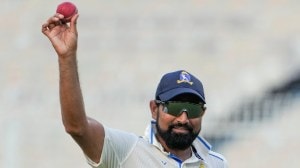Out of Venice
In his last book, Dibdin gets America wrong

End Games
michael dibdin
Faber and Faber
12.99 pounds
A truly dreadful thing to say, especially since death demands a certain reserve, a sentiment Aurelio Zen, Dibdin8217;s not quite-defeated-by-life Venetian police detective, would fully appreciate. But Dibdin, who died this April at 60, was all for unsentimental, caustic assessments, provided they were seen to be fair. So here is mine: Dibdin8217;s oeuvre of literary crime fiction deserved a better end note than End Games. To say it without the beautiful and maddening circumlocution that was the trademark of many of Dib-din8217;s Italian characters, this is the weakest of Zen mysteries. Of course, it is still worth more than a shelf full of modern crime fiction.
Dibdin was masterclass in his trade, and not just because his mysteries always demanded readers8217; devotion to complex narratives. Eleven of his 16 novels featured Zen and Italy, not necessarily in that order. Most modern writers, including those from what the publishing trade calls the high-brow bracket, ultimately fail to come to terms with a foreign country. If you are a keen and compulsive reader, you can mostly tell where 8220;foreignness8221; defeats a gifted observer. Dibdin was one of the rare exceptions. An Englishman who went to work in Italy late in his life but didn8217;t make it his permanent home, his Italy was so authentic that you didn8217;t need to know much about that country to know Dibdin was getting it exactly right. And the way he got it right was by looking straight into the dark bits of Italy8217;s soul all countries have these dark bits. Tradition, kinship, fatalism, prejudice, malevolently malleable notions of modernity, lassitude, bureaucratic inertia, underlying chaos, surprise at how the system works at all 8212; that8217;s Dibdin8217;s Italy. But there isn8217;t just one Italy.
Dibdin made clear in his Zen novels, as he sent the detective from city to city and region to region, that Italy has many ingredients as a genuine pasta sauce Zen is an epicure in a gruff, no-nonsense and distinctly provincial sort of a way; in End Games his Venetian scorn for Calabrian cuisine 8212; too much tomato, for one 8212; is vintage Dibdin humour; catty and earthy but smooth and sophisticated.
Calabria, in south Italy basic info for an Italy uninitiated, north scoffs at southern 8220;primitiveness8221; and south thinks northerners are non-genuine pansies, is where Zen goes in End Games. All Dibdin trademarks are there: Zen8217;s weary recognition of the limits of the System and his meek acceptance that he is a social misfit, brilliantly described local colour, an admirably convoluted plot, ruthless local villains who seem curiously human another Dibdin achievement, the many-layered narrative. Americans mess it up.
A shady American cyber millionaire and his henchman of a manager a Vietnamese-American are the big bad guys here. The story ultimately rides on them. Dibdin, who settled in America, applies the instrument of cold, well-informed satire to the specie of rich, amoral, psychologically disformed American corporate male 8212; and it doesn8217;t work. Not as gloriously as it works in every Zen book, including this one, when he applies the same instrument to Italian villainy.
I haven8217;t read Dibdin8217;s non-Zen/non-Italy books. Two of them are set in America and received good press from demanding reviewers. But I suspect Dibdin never internalised America the way he did Italy.
But really, so what? There are 10 Aurelio Zen books that are pure pleasure. As Zen would know, you can8217;t ask more of life.
- 01
- 02
- 03
- 04
- 05






























